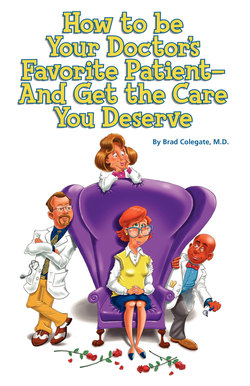Читать книгу How to be Your Doctor’s Favorite Patient - David Claytor - Страница 11
На сайте Литреса книга снята с продажи.
The Name-Caller
ОглавлениеSheila Burnett was in a good mood. After a hectic summer, her kids were back in school, and she’d scheduled an all-afternoon spa treatment to pamper herself. All she had to do this morning was to get her annual Pap smear out of the way and then she’d be able to relax the rest of the day. A Ph. D. in chemistry who’d given up her career to focus on raising her three children, she decided she needed to focus on herself for a change. She’d found out that being a mother and a homemaker was sometimes delightful, sometimes maddening, and always challenging. Certainly she had as much respect now for all those other stay-at-home moms as she did for those charging ahead in the workplace. Her own degree didn’t impress her as much as it used to, though it came in handy now and then when trying to figure out the reason for a culinary disaster or what cleaner to use on the bathtub scum.
The new physician she was meeting today was a woman about her own age (42), and she reminded Sheila of what path her life might have taken if she had stuck to pre-med in college instead of chemistry. “Good morning, Mrs. Burnett,” said the physician. “I’m Dr. Kathy Isaacs. Nice to meet you.”
“Hi, Kathy. It’s nice to meet you, too. You don’t mind if I call you ‘Kathy,’ do you?”
“No, not if you’re more comfortable with that. You can call me Kathy, or you can call me Dr. Isaacs, just don’t call me at two in the morning.”
Sheila laughed and said, “Okay, and please drop the ‘Mrs. Burnett’–it makes me sound too much like my mother-in-law. Considering my Ph.D., I suppose I could be ‘Dr.’ Burnett, but that’s a bit pretentious.”
“It’s a deal,” said Kathy, and the two women shook on it.
Names are a very important part of our identity. Even when burdened with a name like Eugene Periwinkle Borer, or tagged with the moniker of a long-deceased relative, we usually make peace with our own name, and even come to like it–because it’s our name, it’s part of us. For this book, I had thought to assume the nom de plume of B.G. Cole, but when it came time to actually see my name in print, I went with “Brad”—a likeable contraction of the stiff “Bradford”—but kept the “Colegate.” “Cole” seemed like chopping a limb off the family tree.
We all have a right to be addressed as we wish, but sometimes communicating that wish can be difficult. Any “Charles” who is unwillingly reduced to “Chuck” can attest to that. For some, it’s such an emotionally charged point that they suffer in silence rather than risk showing their anger. If you’re someone with this problem simply practice saying “Please call me _____,” until it’s easy to say.
Physicians have earned the title “Doctor” through many difficult years of study and training, and view being as addressed as “Doctor ____” as a simple recognition of that fact, not as a snobbish title that separates them from the masses. Some patients may feel “Doctor” is too formal and distancing, while others subconsciously feel protected by the ‘magical’ power the word invokes. Since it’s important for you to feel at ease with your physician to establish a good rapport, make sure you’re addressing one another in a way that’s comfortable for you both.
Do tell your physician how you’d like to be addressed: “Bob,” “Robert,” or “Mr. Holcombe.”
Do ask if it’s okay to call your physician by her first name, if you’re more comfortable with that. Most physicians won’t mind–they may even prefer it.
Do expect that your doctor may ask you how you like to be called, especially if you’re going to be a long-term patient that she’ll be seeing–and addressing–many times.
Don’t call your doctor just “doc.“ (That sounds like something that belongs in a cartoon!)
